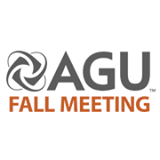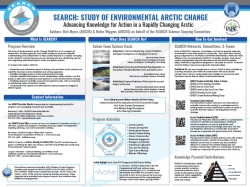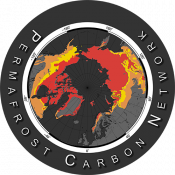 American Geophysical Union (AGU) Fall Meeting
American Geophysical Union (AGU) Fall Meeting
12–16 December 2016
San Francisco, California
SEARCH Town Hall
The Study of Environmental Arctic Change (SEARCH) Program Needs You
Date and Time: Monday, 12 December 2016: 12:30–1:30 p.m. PT
Location: San Francisco Marriott Marquis Foothill E - 780 Mission Street, San Francisco, CA 94103 and online for live event streaming
Town Hall Description: The Study of Environmental Arctic Change (SEARCH) will hold a Town Hall meeting on Monday, 12 December, from 12:30 p.m until 1:30 p.m. PT during the AGU Fall Meeting in the Foothill E room of the San Francisco Marriott Marquis hotel. The event will also be live-streamed for online participation.
At this open Town Hall, SEARCH leadership will discuss how researchers, agencies, and stakeholders can contribute to and participate in SEARCH’s “Permafrost”, “Sea Ice”, and “Land Ice” activities; help steer the work of new cross-disciplinary working groups on coastal resilience and Arctic scenarios; and introduce SEARCH’s new “Knowledge Pyramids.” SEARCH is constructing Knowledge Pyramids to make scientific knowledge available on-line to decision makers, journalists, students, and scientists in diverse fields. Each knowledge pyramid answers a specific question about environmental change in the Arctic through tiers of increasing detail. The top of the pyramid provides—in accessible language—a succinct synopsis of what we know about the question in the form of a 1–2 page brief suitable for policymakers. Published reports back up the brief in lower tiers. The second tier down contains summaries more detailed than the brief; below that are published conceptual and technical syntheses; and, finally, the base of the pyramid is made of detailed technical reports focused on specific details—the scientific building blocks.
Broad participation enhances SEARCH’s success and we invite everyone interested in the Arctic to learn more about becoming part of our community at this event. Light refreshments will be provided. Students and early career investigators are encouraged to participate.
In addition to the in-person event, an online webinar stream will be available for those not attending AGU. To join via an online participant, please register at:
https://www.arcus.org/search-program/meetings/2016/agu/townhall.
Registration is not required for in-person participation.
For more information, contact:
Brit Myers
Email: brit [at] arcus.org
SEARCH Sessions
Permafrost Action Team
Session ID#s & Titles:
B41J: Vulnerability of Permafrost Carbon to Climate Change I
B42D: Vulnerability of Permafrost Carbon to Climate Change II
B43C: Vulnerability of Permafrost Carbon to Climate Change III
Date and Time: Thursday, 15 December 2016: 8:00-10:00 (Session 1), 10:20-12:20 (Session II), 13:40-18:00 (Session III)
Location: Moscone West 2004 (Sessions I & II); Moscone South Poster Hall (Session III)
Session Description: Permafrost zone soils contain between 1330-1580 Pg of carbon. Permafrost degradation can change ecosystem carbon storage by enhancing microbial activity and ecosystem respiration, but can also stimulate plant growth and increase carbon stored in vegetation and surface soil. While increased permafrost carbon emissions in a warming climate are more likely to be gradual and sustained we need a better understanding of the magnitude and timing of greenhouse gas emissions from these remote regions to fully estimate the potential feedback from permafrost carbon to climate change. This session invites papers that examine factors causing losses and gains in ecosystem carbon storage relating to the magnitude, timing and form of carbon release from permafrost. Papers may address any aspect of this topic from microbial communities to the global scale, using a range of measurements or modeling to detect and forecast permafrost thaw and the influence on the carbon cycle and future climate.
Conveners: Christina Schädel, Claire Treat, Edward Schuur
Sea Ice Action Team
Session ID#s & Titles:
C21A: Integrating Observations and Models to Better Understand a Changing Arctic Sea Ice Cover I
C33E: Integrating Observations and Models to Better Understand a Changing Arctic Sea Ice Cover II
Date and Time: Tuesday, 13 December 2016: 8:00-12:20 (Session 1) & Wednesday, 14 December 13:40-15:40 (Session II)
Location: Moscone South Poster Hall (Session I) & Moscone West 3009 (Session II)
Session Description: The Arctic sea ice cover is in decline, with a reduction in summer ice extent and a transformation from primarily perennial ice to seasonal ice. There is a significant need to understand the ongoing changes in the Arctic sea ice cover and to predict future changes. Models play a fundamental role in these tasks by synthesizing the elements of the Arctic sea ice system. However, progress in model development suffers from a disconnect with the discoveries being made within the observational community. Observational activities could make better use of model guidance regarding the relative importance of various processes, and spatial and temporal sampling strategies. This session welcomes presentations that integrate in situ observations and remote sensing data with sea ice modeling studies. Examples of this integration range from improving the treatment of individual processes to advances in coupled earth system models to using models to inform observational network design.
Conveners: Donald K Perovich, Marika Holland
Land Ice Action Team
Session ID#s & Titles
C51A: Glacier-Ocean Interactions, Mechanisms, & Synthesis I
C53E: Glacier-Ocean Interactions, Mechanisms, & Synthesis II
Date and Time: Friday, 16 December 2016: 8:00-12:20 (Session I) and 13:40-15:40 (Session II)
Location: Moscone South Poster Hall (Session I) and Moscone West 3007 (Session II)
Session Description: Ice mass loss from marine-terminating glaciers, with or without floating ice shelves, is a major contributor to global sea level rise. Our understanding of the physical processes controlling glacier-ocean interactions, however, is limited. This session invites contributions from ice-ocean focused modeling, observation (in situ and remotely sensed), and synthesis projects. Example topics include: ocean circulation at the ice sheet/ocean margins; combined study of in-situ oceanic observations, bathymetry, and glacier observations; ice melt beneath ice shelves or at tidewater glacier margins; the climate sensitivity of physical processes controlling ice-ocean interactions throughout the Arctic, Antarctic, and other glaciated regions; and the development of coupled ice-ocean numerical models.
Conveners: Twila A Moon, Fiammetta Straneo, Helen Amanda Fricker
Sessions that Cross-Cut SEARCH Science Themes
Session ID# & Title:
GC23E - Scenario Approaches to Understand Arctic Futures
Date and Time: Tuesday, 13 December 2016: 13:40-18:00
Location: Moscone South Poster Hall
Session Description: Consideration of alternative scenarios for the medium-long term future of the Arctic region can be a powerful approach to synthesis of disparate trends in support of enhanced understanding of the possibilities. Scenario approaches use a variety of scales of analysis to understand the social-ecological systems of a region (or sub-regions), bringing together geoscience, biological science, and interactions of these natural systems with regional and global populations. This session will feature presentations from pioneering research groups involved in Arctic scenario analysis. The audience will learn how these different approaches were developed and structured, and what insights they have produced about possible and likely Arctic futures. Arctic scenarios development is often informed by inputs from global and regional models of climate, atmosphere, marine, and terrestrial change. As a focus, session participants will also be asked to consider how such physical models might be improved to better inform and support more robust scenarios.
Conveners: Robert H Rich, Helen V Wiggins, Brit Myers and Caspar M. Ammann
Session ID#s & Titles:
GC21I: Arctic Environmental Change: Local, Regional, Global Drivers and Impacts I
GC23A: Arctic Environmental Change: Local, Regional, Global Drivers and Impacts II
Date and Time: Tuesday, 13 December 2016: 8:00-10:00 (Session I) & 13:40-18:00 (Session II)
Location: Moscone West 3005 (Session I) & Moscone South Poster Hall (Session II)
Session Description: The Arctic shattered records in the winter of 2016 with extreme heat and exceptionally low sea ice. Uncertainty persists about the roles of local and remote causes of Arctic warming, and how those factors may be influenced by natural and anthropogenic climate change. The interplay between Arctic warming and lower latitudes is increasingly recognized as the science community challenges long-held paradigms of Arctic climate drivers and responses. For example, the recent dramatic reductions in sea ice have prompted novel investigations into the distant controls on ice variability, such as the influence of tropical and mid-latitude variability on poleward heat transport. This session welcomes presentations of cutting-edge interdisciplinary research on drivers, feedbacks, and possible mechanisms linking the Arctic and global climate and ecology, which carries significant societal implications for natural resource management and climate adaptation. Presentations of ongoing international Arctic projects are also welcome.
Conveners: John E. Walsh, Hiroyasu Hasumi, Teppei J. Yasunari, Jennifer Ann Francis
Session ID# & Title:
13418 - GC064: Sustained Observations of Rapid Arctic Change: Scientific and Technological Advances, Observing System Design and Implementation, Findings from Long-term Observations
Date and Time: Tuesday, 13 December 2016: 8:00-12:20
Location: Moscone South Poster Hall
Session Description: A rapidly changing Arctic challenges our ability to predict and effectively respond to major environmental and socio-economic transformations underway in the North and reverberating throughout the global system. Sustained observations of key variables and processes that capture variability, long-term trends and regime shifts, including high resolution paleoclimate records, are central to furthering understanding of the drivers and impacts of change, the development of prediction systems from sub-seasonal to decadal timescales and to the implementation of adaptation and mitigation measures. This session welcomes presentations that describe major findings and lessons learned from existing observing efforts at high and mid latitudes, as well as those that address the full range of scientific issues underlying development and implementation of Arctic observing systems, such as advances in the science and technology of sustained observations (incl. autonomous sensor systems), observing system design and implementation.
Conveners: Hajo Eicken, Julie Brigham-Grette, Craig Lee, Peter Schlosser
SEARCH Poster
 SEARCH Poster Title: GC23A-1208 Promoting Knowledge to Action through the Study of Environmental Arctic Change (SEARCH) Program
SEARCH Poster Title: GC23A-1208 Promoting Knowledge to Action through the Study of Environmental Arctic Change (SEARCH) Program
Date and Time: Tuesday, 13 December 2016: 13:40 - 18:00
Location: Moscone South Poster Hall
Description:The Study of Environmental Arctic Change (SEARCH) is a multi-institutional collaborative U.S. program that advances scientific knowledge to inform societal responses to Arctic change. Currently, SEARCH focuses on how diminishing Arctic sea ice, thawing permafrost, and shrinking land ice impact both Arctic and global systems. Emphasizing “knowledge to action”, SEARCH promotes collaborative research, synthesizes research findings, and broadly communicates the resulting knowledge to Arctic researchers, stakeholders, policy-makers, and the public. This poster presentation will highlight recent program products and findings; best practices and challenges for managing a distributed, interdisciplinary program; and plans for cross-disciplinary working groups focused on Arctic coastal erosion, synthesis of methane budgets, and development of Arctic scenarios. A specific focus will include how members of the broader research community can participate in SEARCH activities. http://www.arcus.org/search![]() SEARCH Poster for AGU Fall Meeting 2016 (PDF - 37 MB)
SEARCH Poster for AGU Fall Meeting 2016 (PDF - 37 MB)
SEARCH Workshops
Permafrost Carbon Network Meeting

Date and Time: Sunday, 11 December 2016: 9:00am - 5:00pm
Location: Parc 55 Hotel (55 Cyril Magnin Street, San Francisco, California, USA, 94102)
Workshop Description: Our 6th Annual Meeting of the Permafrost Carbon Network will take place on Sunday, December 11 (9:00am - 5:00pm) before AGU at the Parc 55 Hotel (55 Cyril Magnin Street, San Francisco, California, USA, 94102). In the morning, we will provide updates on previous, ongoing, and new synthesis activities. The afternoon is dedicated to break out discussions on ongoing and new synthesis activities. Lunch will be provided for registered participants and a preliminary agenda can be found online here.
REGISTRATION FOR THE WORKSHOP IS NOW CLOSED
For questions, please email Christina Schädel (christina.schaedel [at] nau.edu) or Ted Schuur (ted.schuur [at] nau.edu)
2016 Arctic Report Card Release
Date and Time: Tuesday, 13 December 2016, 10:30am
Location: Moscone West 3000 and online via webstreaming
NOAA's Arctic Report Card has been issued annually since 2006. It is an important peer-reviewed source for clear, reliable and concise environmental information on the current state of different components of the Arctic environmental system relative to historical records. The Report Card is intended for a wide audience, including scientists, teachers, students, decision-makers and the general public interested in the Arctic environment and science. SEARCH will be featured in the 2016 report.
SEARCH-Relevant Sessions Featuring Contributions From Members of the SEARCH Community
Session ID#s & Titles:
A51M: Extratropical and High-Latitude Storms, Teleconnections, Extreme Weather, and the Changing Polar Climate I
A52A: Extratropical and High-Latitude Storms, Teleconnections, Extreme Weather, and the Changing Polar Climate II
A53B: Extratropical and High-Latitude Storms, Teleconnections, Extreme Weather, and the Changing Polar Climate III Posters
Date and Time: Friday, 16 December 2016 - 8:00-10:00 (I), 10:20-12:20pm (II), 13:40-18:00 (III)
Location: Moscone West 3010 (Sessions I & II), Moscone South Poster Hall (Session III)
Session Description
Synoptic storms and large-scale teleconnections are prominent features characterizing daily-to-decadal climate variability in the extratropics and high latitudes. Storms often bring extreme weather, including high-wind events, large ocean waves and surges, coastal flooding and erosion, as well as rapid temperature changes. Teleconnection patterns
play modulating roles in storm activity, linking polar and midlatitude climate. In addition, the tropics has been recognized as an important source for triggering teleconnections, and may also be subject to impacts of polar climate changes. Storms and teleconnections have demonstrated systematic variations, leading to alterations of feedback processes and, in turn, contributing to climate variability and change. This session will provide a venue to present progress and new ideas on extratropical and high-latitude storm activity, tropical or extratropical teleconnections with the polar regions, and associated physical feedback processes in the context of the changing polar climate, as well as resulting extreme weather events, ecosystem- and societal impacts.
Conveners: Xiangdong Zhang, Kent Moore, James Overland
Session ID# & Title:
A131: Useful and usable data: What makes climate science actionable?
Date and Time: Monday, 12 December 2016 13:40-18:00
Location: Moscone South Poster Hall
Session Description: Properly developing and validating climate data, information and knowledge for societal decision making is a critical challenge for scientists. Equally, stakeholder access to data is not sufficient. Only by asking more comprehensive and nuanced climate questions can robust and balanced actions be determined and transparently communicated. But what determines which data are ultimately actionable? What criteria can scientists use to develop, test, and communicate actionable science? Is it sufficient to create useful indices, in a usable format? What scientific framework remains true to the fundamental understanding yet also provides actionable outcomes for decision makers? This session presents (1) initiatives to explore the development of climate indicators critical for decision making, (2) new tools and techniques for validating key characteristics, (3) methods for providing more comprehensive guidance for the decision making process, and (4) ways to effectively integrate these approaches & tools into the climate model development process and application environments.
Conveners: Caspar M Ammann, William J Gutowski Jr, Laurna Kaatz, Keely Brooks
Session ID#s & Titles:
C33B: Remote Sensing of the Cryosphere I - Posters
C41F: Remote Sensing of the Cryosphere II - Snow
C42B: Remote Sensing of the Cryosphere III - Arctic
C43D: Remote Sensing of the Cryosphere IV - Frontiers
C44B: Remote Sensing of the Cryosphere V - Land Ice
Date and Time: Wed, 14 Dec, 13:40-18:00 (I); Thurs, 15 Dec, 8:00-10:00 (II), 10:20-12:30 (III), 13:40-15:40 (IV); 16:00-18:00 (V)
Location: Moscone South Poster Hall (Session 1); Moscone West 3007 (Sessions II-V)
Session Description: This session highlights recent scientific results in all aspects of remote sensing of the cryosphere, including snow, glaciers, ice sheets, ice shelves, sea ice, permafrost, and lake and river ice. Presentations address interpretation of data from satellite, airborne or in situ instruments in any region of the electromagnetic spectrum, acoustical or gravimetric data. Submissions may include validation of observations, new processing of historical data, new sensors and sensor platforms, multi-sensor observations, application of the remote sensing data for data assimilation, new model developments for remote sensing and/or model validation.
Conveners: Mary J. Brodzik, David Robinson, Allen Pope, Mahsa Moussavi,
Session ID#s & Titles:
C21B: Modeling of the Cryosphere: Glaciers and Ice Sheets I
C31C: Modeling of the Cryosphere: Glaciers and Ice Sheets II
C32A: Modeling of the Cryosphere: Glaciers and Ice Sheets III
Date and Time: Tues, 13 Dec, 8:00-12:20 (Session I); Wed, 14 Dec, 8:00-10:00 (Session II), 10:20-12:20 (Session III)
Location: Moscone South Poster Hall (Session I); Moscone West 3007 (Sessions II & III)
Session Description: This session focuses on process-based modeling of glaciers and ice sheets that improves our understanding of ice dynamics or enhances the capabilities of current models. We invite contributions from a broad range of theoretical, numerical, or experimental studies that explore new or improved representations of physical processes relevant to ice flow. The range of topics that is encouraged includes, but is not limited to: basal processes (such as glacial hydrology, erosion, surging, the onset of ice streams), mechanical and thermodynamic processes (constitutive relationships, material behavior, ice fracturing), and ice-ocean interactions (for example calving, grounding line dynamics).
Conveners: Stephen F Price, Sophie Nowicki, Christian Schoof, Ian Hewitt
Contact Info
For more information on SEARCH activities at AGU, please contact Brit Myers at brit [at] arcus.org.
